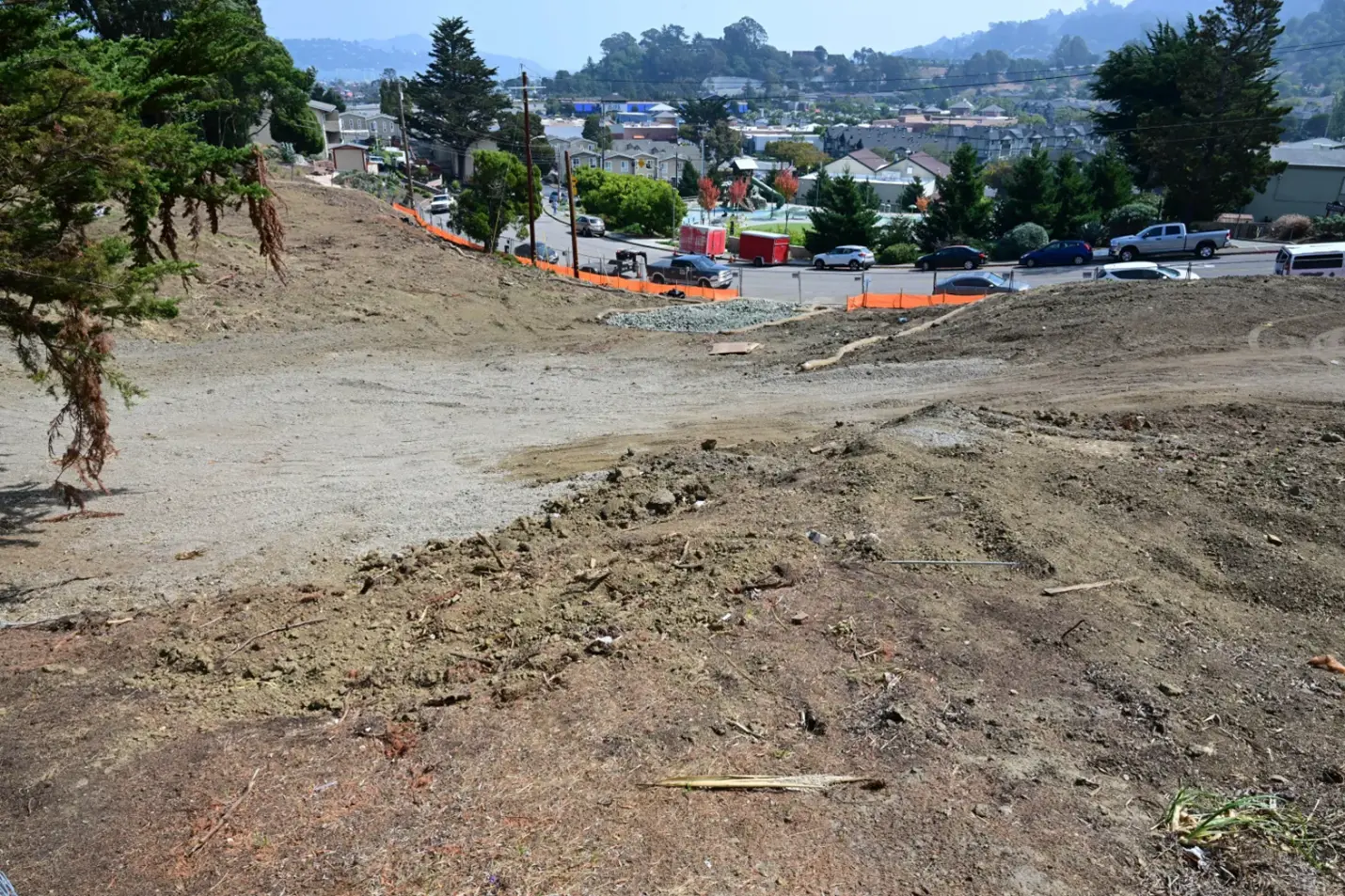By RICHARD HALSTEAD | rhalstead@marinij.com | Marin Independent Journal
PUBLISHED: October 9, 2023 at 6:03 p.m. | UPDATED: October 10, 2023 at 5:10 a.m.
https://www.marinij.com/2023/10/09/marin-city-residents-file-federal-suit-over-housing-project/
 The lot at 825 Drake Ave. in Marin City is slated to be developed into a 75-apartment complex. (Sherry LaVars/Marin Independent Journal)
The lot at 825 Drake Ave. in Marin City is slated to be developed into a 75-apartment complex. (Sherry LaVars/Marin Independent Journal)
A controversial apartment project in Marin City is facing another legal challenge.
The Golden Gate Village Resident Council has filed a federal lawsuit asserting that the county, in reviewing the project at 825 Drake Ave., failed to adequately comply with the National Environmental Policy Act.
The federal equivalent of the California Environmental Quality Act, the law defines procedures for environmental analysis for projects that need approval by federal agencies.
“We’re sick and tired of the county aiding and abetting developers who see Marin City as easy pickings,” said Royce McLemore, president of the neighborhood council. “We’re a strong, tight-knit community, and we’re not going to take it anymore.”
The project, which calls for a 74-apartment building with five stories, has already been sued by Save Our City, a local advocacy group. The group contends that county supervisors improperly approved the issuance of revenue bonds to help fund the project.
“My case is focused on the environmental review of the project,” said Kevin Haroff, an attorney who is representing the resident council at no charge. A former member of the Larkspur City Council, Haroff has represented the Marin City council on other issues in the last two years.
In the suit, Haroff says Marin County “disregarded substantial evidence that the project would have numerous significant impacts that warranted consideration in a full environmental impact statement.”
The suit also asserts that the county failed to give the public adequate time to provide comments on those impacts and ignored important facts in whatever comments it did allow.
The project must comply with the federal act because the Marin Housing Authority has assigned 25 project-based Section 8 vouchers to the project. Households who receive Section 8 vouchers are guaranteed to pay no more than 30% of their income for rent, and the federal government pays the rest.
Normally, such vouchers are given to people who can use them to live wherever they want. Project-based vouchers, however, can only be used to pay rent in the building to which they’ve been assigned. Since the vouchers help guarantee the project owner a stable future revenue flow, they aid in the financing of the project.
The new suit, filed on Sept. 11 in the U.S. District Court for the Northern District of California in San Francisco, asserts that the county erred when it concluded that the project would result in no significant environmental impact and therefore didn’t require more detailed study.
“The Marin Housing Authority approved Section 8 vouchers for the project, and the county served as the responsible entity for evaluating environmental impacts under NEPA,” Marin County Counsel Brian Washington wrote in an email. “The county is confident that its NEPA compliance work complied with the law.”
Haroff disagrees.
“The proposed project is completely out of character with the surrounding neighborhood,” he said. “It would also have significant adverse consequences on the residents of Golden Gate Village, which is on the National Register of Historic Places and is home to the greatest concentration by far of Black Americans in Marin County.”
Golden Gate Village, a public housing complex with about 650 residents, is in Marin City but not directly adjacent to 825 Drake Ave. Nevertheless, the suit states that the project would block the light and views of 25 apartments for seniors at Village Oduduwa.
According to the filing, the lack of light would encourage the growth of mold, which has been linked to respiratory tract symptoms. The suit also mentions the increased risks associated with adding an estimated 182 new residents to an area in a high fire hazard zone and one that is prone to flooding.
“Among the other glaring problems with the project,” the suit states, “is its lack of adequate residential vehicle parking. The project currently calls for just 24 surface parking spaces.”
“The project will leave residents and others with few places to park on a steep hillside that many cannot physically navigate,” the lawsuit says.
The suit also cites regulations that require the project to meet not only the requirements of NEPA but a range of federal environmental, cultural and environmental standards above and beyond NEPA.
For example, it asserts that gentrification trends in Marin City will be amplified because the average resident will not be able to afford a dwelling in the project.
One of the reasons the project has been assigned Section 8 vouchers is to provide alternative housing in Marin City for older residents of Golden Gate Village who might soon be forced to move.
The U.S. Department of Housing and Urban Development has mandated that the Marin Housing Authority relocate to smaller apartments those tenants whose family size has diminished, but there is a shortage of such apartments in Marin City.
The project’s developer, Caleb Roope, the chief executive officer of Pacific West Communities, has agreed to submit some design changes to county planners for their review and approval before beginning construction.
Roope has pledged to alter his plans to provide at least one parking space per apartment, and make landscaping changes and other design changes to render the building less visually obtrusive.
Roope said in September that he expected to submit the plans to the county within the next month or two. He said he will provide advance notice to the community before beginning construction.

